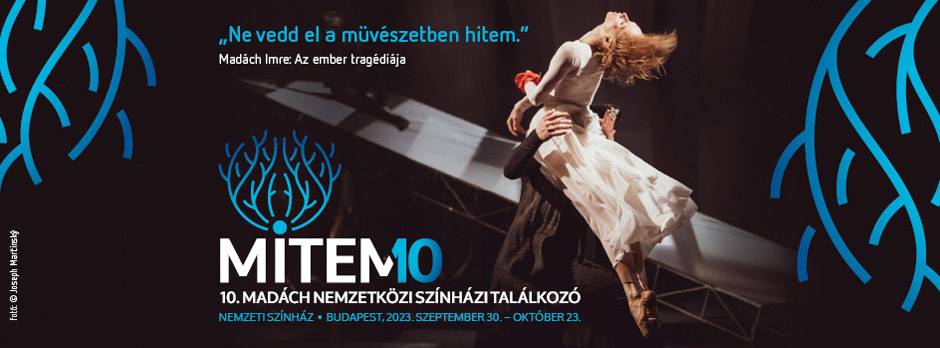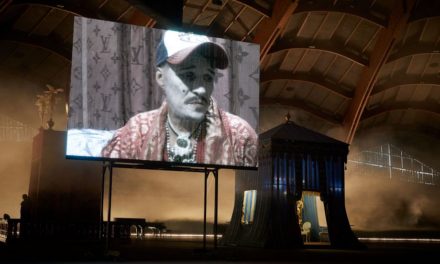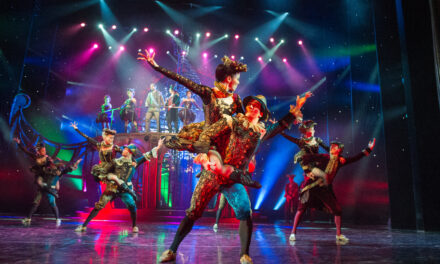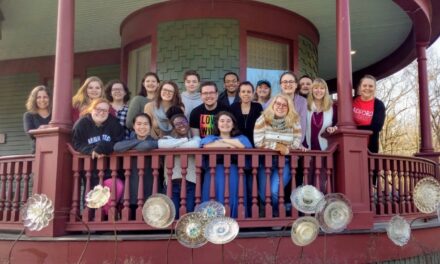Budapest is becoming a vibrant place and proving highly attractive to theatre lovers. All the flags of the world gather here, inspired by the energy and life-giving power of theatre. Surprisingly, the Hungarian capital has managed to attract and involve in its theatre festival representatives of different theatre schools, trends, beliefs, and types of theatre. They are not crowded here. This celebration, which began with the Theatre Olympics, and will continue with the upcoming tenth anniversary Madách International Theatre Meeting (MITEM), is not, however, intended to entertain or distract the audience from serious global issues and challenges. On the contrary, the programme of festivals and events in one way or another addresses the most painful and disturbing issues of our time through the prism of theatre. Old and new forms, classics and acute modernity, harmony and collision, dialogue and debate – all this and always a little more is present in Hungary, which has become a unique point of attraction. In a relatively short period of time, through the efforts of Attila Vidnyánszky, the main organiser and founder, Hungary has managed to make a giant leap forward and become not an ordinary but a significant point on the world theatre map. This is a unique case that is already worth studying at universities that train managers in the field of culture and arts. It is also a story about dreams coming true if you dream big!
2023 is a milestone in the history of the Hungarian Theatre. In the spring of 2023, the Theatre Olympics took place here, which was the largest in the history of this project. Four hundred companies from fifty-eight countries visited Hungary and presented around seven hundred fifty productions. The theatrical whirlwind took over not only the capital city, but all regions of the country, allowing every spectator from the most remote corners to touch the miracle of theatre. This is not only a theatrical celebration, but also an important social project, aimed, among other things, at curing the trauma inflicted on all of us and the theatre industry by the pandemic. The audience on the one hand missed the theatre, and on the other hand learned to do without it, acquiring a fear of attending collective events. The Theatre Olympics helped to overcome this fear. It also proved that despite wars and confrontations, theatre people are true ambassadors of their countries’ culture and true human values. The weather in Hungary can change in a heartbeat in spring, but during the days of the Theatre Olympics it was warm and bright in a human way; there was no tension, political disputes, or slanted glances. This was a great victory for the organizers because it was probably the Theatre Olympics with the most information-heavy background. Art has won the momentary. I wish it could always happen like this.
The special edition of Madách International Theatre Meeting is also perceived as a continuation of the Theatre Olympics. This year it presents a quadriga of thematic blocks, including MITEM+ with Comédie-Française, State Theatre of Košice, Yugoslav Drama Theatre; Synergy Festival with theatre performances by linguistic and national minorities from Ufa to Cologne; National Theatre Showcase with the host theatre’s successful, innovative productions in recent years and BEREHOVE 30 – legendary performances by Hungarian Theatre of Berehove, celebrating its 30th anniversary. It is almost impossible to embrace the vastness of the world, but maybe it is this feeling of “under-exploration” that will make you come back to Hungary again and again.
It is not only the dates and the “anniversary” that unite the Theatre Olympics and the MITEM events but above all the moral code and ethical principles. There is no competition, no winners or losers, no hierarchy, and no labeling. There is no dictate of “box office” and fashion trends. It sounds idealistic, but it turns out that this ideal is achievable. Here there is no stifling of art, art race, and competition. Instead, there is search and discovery, theatrical experiments in form and new artistic language, and adjacent examples of traditional theatre that does not look “museum” or “old-school”. From folk dance to new drama, from circus to puppet theatre, from epic canvases to amateur theatre, there is room for all, different genres do not clash but interact, enriching the audience’s experience. Directors and playwrights – people of the theatre – here closely and astutely shape a program that offers audiences a cross-section of world and national theatre. This is not a crème de la crème or a vanity fair of famous names and brand names, but above all a palette of quality productions into which the artists have poured their thoughts, feelings, emotions, intention, originality, and author’s handwriting. The selection of performances here is carried out carefully and painstakingly and, for example, getting into the National Theatre Showcase is already a significant achievement for the performance and its creators. And for the audience, given MITEM’s many years of trust, it is a guarantee of quality. If you are just starting your journey into the world of theatre or think you have seen everything in theatre, you should be in Hungary and make sure that the time to be surprised (pleasantly) has not yet passed.
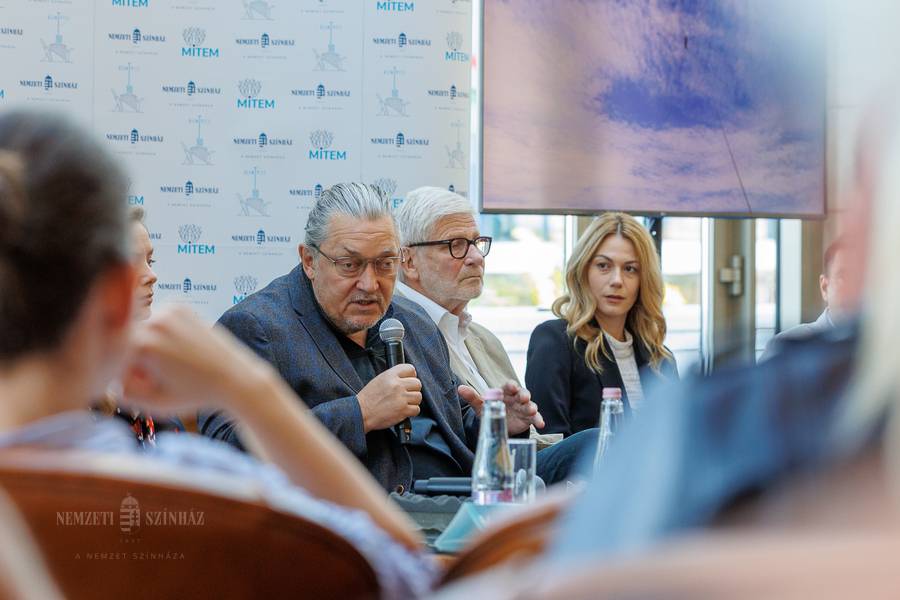
Vidnyánszky Attila, Nemzeti Színház | Fotó: Eöri Szabó Zsolt
The original idea behind MITEM was to bring national theatre into the international theatre context, but as is often the case in heroic films, by solving a personal problem, the hero saves the world. MITEM is what confronts the destructive tendencies in the world that kill the human in man. MITEM seeks to bring together artists from different countries and schools, opinions, and approaches on the territory of a theatre that is a unity of opposites.
MITEM started with performances from twelve countries. In ten years this figure has reached fifty countries and three hundred performances. Judging by the systematic and confident movement of this initiative and its team, this is not the limit. The statistics of this jubilee meeting suggest the number ten – the 10th MITEM, ten performances, ten theatre companies, and twenty-one theatre productions. From 30th September to 23rd October 2023, the Hungarian stage will hear Yiddish, Polish, Hungarian, Russian, French, Slovak, Serbian, German, English, and other languages, the main language of which will be the language of theatre.
The language of memory, resurrecting mameloschen – mother tongue in Eugen Gyemant’s The Book of Ruth (by Mario Diament) will become consonant with the language of fantasy on the themes of The Overcoat (by Nikolai Gogol) directed by Avtandil Varsimashvili and will be complemented by the sound of the language of history and the agony of the world in Agon (by Péter Pál Józsa) directed by Attila Vidnyánszky. The language of overcoming stereotypes will be heard in Nada Kokotović’s production inspired by the film script by Rainer Werner Fassbinder Fear Eats the Soul, it will be echoed by the language of overcoming censorship in Ivo van Hove’s production of the Three-act version, censored by Louis XIV Tartuffe or the Hypocrite by Molière, and the language of human tragedy against the backdrop of dislocated time will be voiced by Attila Vidnyánszky Jr. in a production of Woyzeck (by Georg Büchner). These and other theatre languages and dialects will hopefully find a common language with the multilingual audience.
The famous majestic and graceful bridges of Budapest must have served as inspiration for the organizers of MITEM because building cultural bridges is the main mission of the festival and theatre forum. Here, ideological and political contradictions that are simply not allowed into the theatre hall are successfully overcome. The absence of hypocritical “fine-spiritedness” and “lusciousness” is a feature of the festival, which manages to show sharp angles, but not to wound with them.
Exhibitions, film screenings, discussions, a professional platform, premieres, and tours, as well as a “festival within a festival” – all this is MITEM. The symphony and interpenetration of the arts are also embodied by the Synergy World Theatre Festival, which is integrated into the festival program. The focus of the festival is on linguistic and ethnic minorities. By preserving rare languages and searching for a new artistic language, the Synergy Festival broadcasts its cultural mission that extends far beyond the theatre stage. Multiculturalism and linguistic diversity, as well as attention to usually underestimated national theatres, are all the things that the festival, founded in Serbia but easily transcending geographical boundaries, strives to embody, just as its performances transcend the language barrier between the stage and the audience.
A culture of openness, curiosity, and understanding – these are the three dominant themes. They unite the Theatre Olympics and, in fact, its final chord – Madách International Theatre Meeting. The motto of the Theatre Olympics was the lines “O Man, strive on, strive on, have faith; and trust!” of the outstanding Hungarian poet and playwright Imre Madách from his magnum opus, The Tragedy of Man. MITEM’s motto is also taken from this work and is “Don’t rob me of my faith in art.” It is faith today that is the dominant force, the foundation and moral pillar that helps us to overcome the daily knockouts of news and helps us not to get lost in the grey and black shades of the century. Faith in art, in human beings, in higher forces, in oneself, in tomorrow, in the dissipating darkness, in light, in mercy, in justice, in the first cry of a new man born for happiness, albeit late, but nonetheless triumphant.
The Theatre Times will inform you about the interesting performances and events of the 10th edition of the Madách International Theatre Meeting.
This post was written by the author in their personal capacity.The opinions expressed in this article are the author’s own and do not reflect the view of The Theatre Times, their staff or collaborators.
This post was written by Emiliia Dementsova.
The views expressed here belong to the author and do not necessarily reflect our views and opinions.

